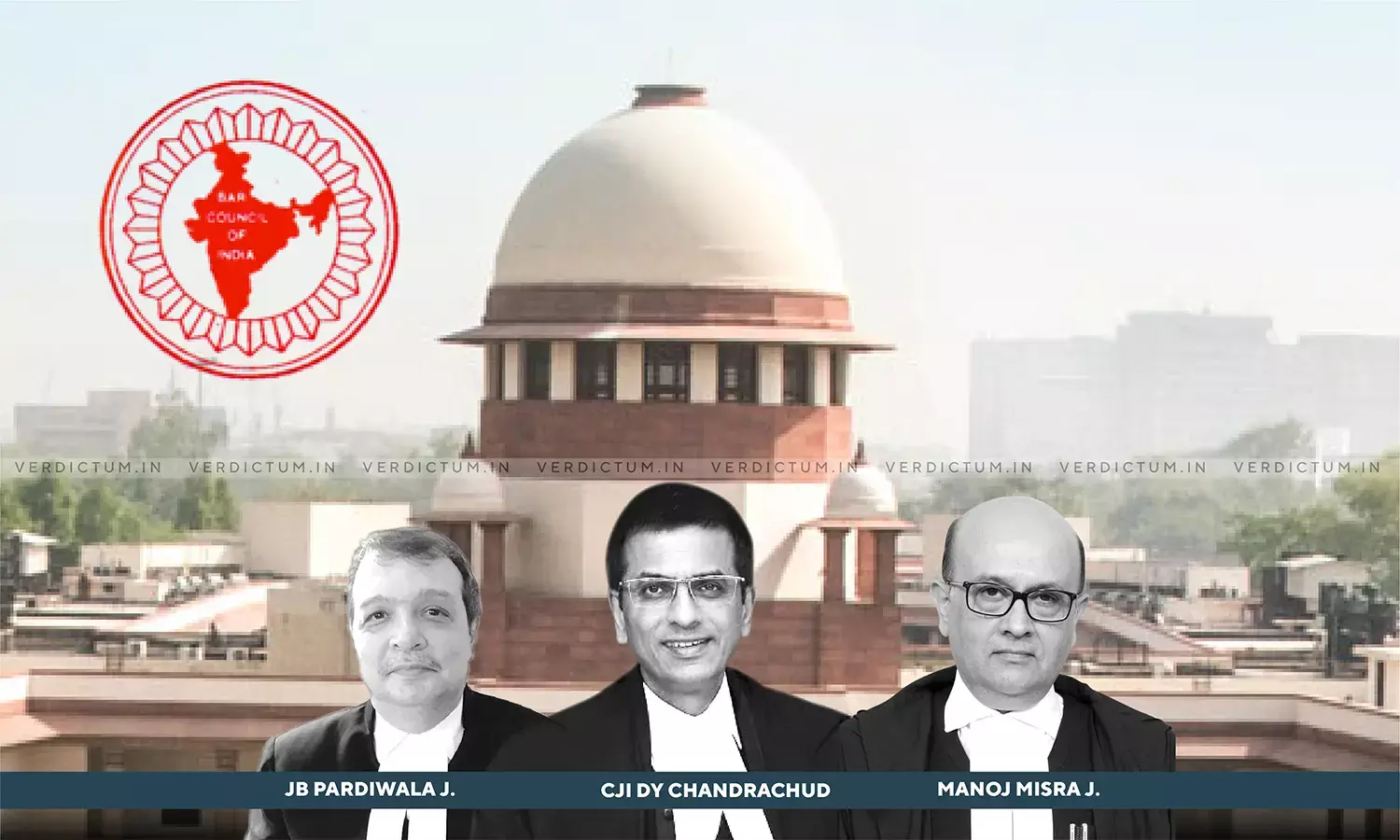Supreme Court Issues Notice In Lawyer's PIL Seeking Proportional Representation Of Women, PwDs, Queer & Marginalized Communities In Bar Councils
The Supreme Court today issued notice in a public interest litigation (PIL), raising concerns over the under representation of women, queer individuals, persons with disabilities, and marginalized communities in the Bar Council of India (BCI) and State Bar Councils.
The petitioner, also a member of the Supreme Court Bar Association (SCBA), Yogamaya M.G., has urged the court to take cognizance of this issue and address the lack of proportional representation in these bodies.
The Bench of Chief Justice DY Chandrachud, Justice JB Pardiwala, and Justice Manoj Misra issued notice in the PIL and sought the Union of India's response on it.
During the hearing, the Senior Advocate PV Dinesh appearing for the petitioner referred to the chart comprising the data from various state bar councils, and submitted that the representation is nil.
The petition filed through AoR Shyam D. Nandan highlights that despite the existence of the Advocates Act, 1961, which governs the structure and functioning of bar councils, there has been no legislative intervention to ensure fair representation of these marginalized groups. The petitioner argues that the gross underrepresentation violates the fundamental rights guaranteed under Articles 14, 15, 16, and 21 of the Indian Constitution, which promote equality and prohibit discrimination.
The petition presents data from various state bar councils to emphasize the severity of the issue, revealing that many councils, including those in Andhra Pradesh, Gujarat, Uttar Pradesh, Punjab, and Haryana, have no women members. It contends that Section 3(2) of the Advocates Act, which discusses "proportional representation" for electing members of state bar councils, should be interpreted to ensure the inclusion of women, queer individuals, persons with disabilities, and other marginalized groups.
The PIL also underscored how patriarchal norms and the politicized, expensive nature of campaigning for Bar Council elections hinder the participation of women and other disadvantaged sections. The petition argues that many professional lawyers, especially women, face challenges balancing their legal practice with family responsibilities, which limits their ability to engage in such election campaigns.
"Many lady lawyers are not able to contest the Bar Council elections as the campaigning for Bar Council Elections is highly politicized and can be expensive and time- consuming, requiring extensive networking and resources. Many of the members of the Bar Council have been preparing for contesting elections at the cost of their practice. Therefore, it is highly necessary that this Hon’ble Court may pass appropriate directions to regulate the Bar Council election process so that many meritorious professional lawyers, who are not full-time politicians, can spare their time for the benefit of the administration of justice," the petition reads.
The PIL also refers to the recent efforts made by the judiciary to address gender inequality and the marginalization of disadvantaged groups. Several landmark judgments, including NALSA v. Union of India (2014) and Vishaka v. State of Rajasthan (1997), have affirmed the need for affirmative action in various fields, including the legal profession. It also notes the success of legislative initiatives like the 73rd Constitutional Amendment, which mandates reservations for women in local governance.
The petitioner further pointed out that although the Bar Councils are supposed to regulate the legal profession, their male-dominated composition often overlooks issues pertinent to women and other underrepresented groups, such as the construction of gender-neutral toilets, crèche facilities, and sexual harassment redressal mechanisms in court premises.
Additionally, the petition seeks appropriate directions from the court to regulate the Bar Council election process, making it more inclusive and accessible for women and marginalized communities. It argues that such reforms would ensure a more equitable legal profession and enhance the overall administration of justice.
"The inadequate representation influences the decision-making process of the Bar Council of India & State Bar Councils. Despite existence of these bodies, many a time, the judiciary has advocated for construction of toilets, effective mechanism for addressing sexual harassment cases, establishment of crèche in court premises, etc. If there is adequate representation of unrepresented segments, many of such issues can be dealt with more effectively, which will find place in the agenda of such representative bodies," the PIL reads.
Cause Title: Yogamaya M.G v. Union of India [W.P.(C) No. 581/2024, Diary No. 38583/2024]












